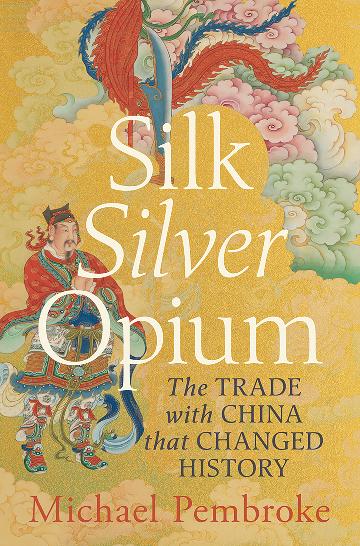
Book Review
Silk, Silver, Opium by Michael Pembroke
The Trade with China That Changed History
(341 pages with Notes and Index.)
Available at Kinokuniya and Popular.
This is the most horrible book I have ever read, and also the most fascinating. Absolutely unputdownable. If you have a sensitive stomach, I recommend stopping at page 180. The rest of the book is for those with stronger constitutions.
How did the author emerge from this still book sane? I almost went mad reading it!
The book starts with the first Roman contact with Chinese Silk in 53 BCE, which caused a sensation. It was fabric like none they had ever seen. The Romans didn’t know where China was, nor of the metaphorical Silk Road along which the silk had made a 7000-mile journey.
Then the story fast forwards to the 13th century and the Mongol expansion towards Europe. “They were a nomadic culture of furs and felts … and fine silks of China.” The Silk Routes were reestablished, and for over three centuries, European merchants travelled freely on the land route, carrying silk, porcelain, spices, and luxuries from Asia, spreading religion, ideas, commerce, and disease. Italy served as the gateway to Europe.
Then the Portuguese discovered the sea route around the Cape of Good Hope, leading to Calicut in India and Melaka, and the European trade exploded.
Europe fell in love with China. Chinoiserie became the vogue. For over half a millennium, “the fabulous land of Cathay and the phantasmagorical world” was the darling of Europe. They praised “the high quality of roads and bridges, the perfect design of the city, the rational organisation of production, the efficiency of the local governments and the impartiality of the legal system.”
China also became a silver (money) pit. Europeans want everything from China. But the attraction was not mutual. China produced everything, and whatever Europe made was not comparable in quality or variety. For example, the demand for fine tableware from China was high, as Europeans could not produce anything like it. So. silver left European exchequers in a deluge, virtually bankrupting the host. Still, the demand wouldn’t stop.
Then it all came to an end. To paraphrase the author, European traders were coarse and uncouth, which is no surprise; they morphing into incarnations of Beelzebub, increasingly unreasonable and demanding, provoking two Opium Wars.
Then in the 19th century, the British created “the world’s first drug cartel, “one of the most pernicious, yet well-organised and profitable drug trades that has ever existed.”
“ Without opium, Chinese history … would have been far different.” For the East India Company, it yielded high profits with low risks, a monopoly, and low production costs thanks to Indian labourers, “sometimes standing waist-deep in the vicious poison.”
“As wretched men trudged and stirred, as cane-wielding English overseers, keeping their distance from the poison.”
“The scene was goulish: the men’s bodies were listless. Their eyes often vacant, glazed and often red in the dark …from exposure to raw opium.”
The drug was legal in India, but “There were no illusions about the illegality of the opium trade in China.” “The directors of the Company in London knew that opium was contraband, and the British parliament knew it.” But the British savages didn’t care. Profits were too high. (I’m avoiding details because the depravity sickens me.) The British were not human. Not animals either, as that would insult the beast. (I thought Chinese calling foreigners barbarians and devils was a particular form of xenophobia. Now, I wonder. Of course, they saw the Devil.)
The Western media dismisses “One Hundred Years of Humiliation” as only a quaint Chinese expression. The British were monsters, pure evil, the army of His Satanic Majesty, who preach democracy and human rights to us.
A nuclear holocaust would have been more humane.
China will never forgive them. This stain will remain on Europeans for a thousand years.
The author concludes, “American novelist Jack London wrote of the menace to the Western world … [from] four hundred millions of yellow men.”
And Western anxieties that (Bornsparte’s) sleeping giant could “world turn on” them remain.
“That fear has never quite gone away.”
